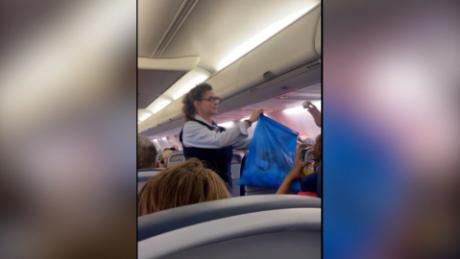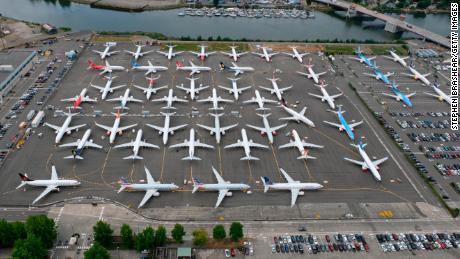New York (CNN)Boeing plans to restart the production of the troubled 737 Max months before regulators approve the plane to fly again, CEO Dave Calhoun said Wednesday.
Calhoun, holding his first conference call with the media since taking the top job at Boeing last week, said it is important that Boeing get its assembly line in Renton, Washington, going again sooner rather than later.
Boeing continued to build the plane throughout 2019, even after the jet was grounded in March following two fatal crashes that killed 346 people. Work on the line was temporarily halted last week.
Calhoun did not give a specific target date when work on the jet will restart, though in answer to a question he suggested it could be in two to three months. He said production would begin very slowly at first.
On Tuesday, the company said it does not expect regulatory approval for the plane to fly until the middle of this year. Boeing had hoped to have the plane back in the air by the end of 2019, but FAA Administrator Stephen Dickson announced on Dec. 11 that would not happen until some time this year. Earlier Wednesday United Airlines (UAL) officials said they are not expecting to have the Max flying passengers again this summer.
Because Boeing could not deliver completed 737 Max aircraft during the grounding, it now has about 400 jets parked in Washington and Texas waiting to be delivered to airlines around the world. But Boeing (BA) doesn't get most of its money from the sale of the jets until they are delivered. It has been a serious financial drain on the company to continue to incur the costs of building them without delivering them.
Still, a long shutdown of production could make it more difficult to restart production. Some suppliers now face their own financial problems due to Boeing's assembly line shutdown. Its largest supplier, Spirit AeroSystems (SPR), which makes the fuselage and other parts for the Max, announced on January 10 that it would lay off 2,800 employees in Wichita, Kansas. Other Boeing suppliers likely have furloughed staff without making public announcements. At least seven other Boeing suppliers get 10% or more of their revenue from the 737 Max program, according to credit rating agency Moody's.
Calhoun confirmed that Boeing will not lay off or furlough any of its own staff during the shutdown. With unemployment in the Seattle metropolitan area at 2.9% -- lower than the national unemployment rate that's at a 50-year low -- Boeing can't risk losing the workers it will need to restart production. In his email to Boeing employees a week ago, Calhoun said the company would "keep taking steps to maintain our supply chain and workforce expertise so we're ready to restart production."
Confidence in Boeing shaken by crisis
Calhoun said in his first nine days on the job he has met with employees, airline customers, FAA officials and members of the Pentagon and the Trump administration. He admitted that Boeing had not been transparent enough in the past, especially as it repeatedly missed its own target dates for returning the Max to service.
"We kept creating a bigger problem for ourselves. It was tough for anyone to trust us," he said.
But he said the long process to get the plane approved to fly again will be helpful in convincing the public that it is safe to fly.
He denied suggestions that Boeing had abandoned its culture of putting safety first, causing the Max's problems.
"I didn't see at any stage in that process....an issue of a trade of safety for something else," he said. He said the problems with the jet were due to a mistake in "judgment that everyone wishes wasn't made."
But he admitted that confidence in the company among the public, and Boeing employees, has been damaged.
"I believe this culture is a good one," he said about Boeing employees. "They believe in safety first. Their confidence right now is shaken."
"The message that the markets and our customers have sent to us is..safety first," he said elsewhere during the call. "Without it there is no shareholder value."
Certain that the plane will return to service
Boeing has not considered or even planned for the possibility that the 737 Max will not be allowed to return to service.
"I believe in this airplane. It's not that I believe in because we built it. Pilots believe in it. I think even the FAA has a lot of confidence in this airplane," he said.
He firmly believes that passengers will be willing to fly on the Max again when they see pilots giving the plane their vote of confidence.
"When pilots get on this airplane, and fly this airplane, I believe that customers will follow," he said.
Some people, including President Donald Trump and the chairman of one major customer, Air Lease, have suggested that the 737 Max should be rebranded. But Calhoun dismissed that idea, saying that "would be silly."
No cuts in the dividend
Last year, Boeing halted share repurchases to conserve cash during the crisis. But the company will not reduce or suspend its dividend, which paid shareholders $4.6 billion since the fourth quarter of 2018. Calhoun said it has the financial strength to pay its dividend, cover the costs of fixing the Max and compensate airline customers for the grounding.
That news lifted shares of Boeing (BA) off its lows of the day, and the stock closed down 1.6%
Finally, Calhoun said he intends to stay on the job until the plane is flying again and the company's backlog of planes has been delivered to airlines, a process that will take several years or longer. Boeing's retirement policy generally requires employees to retire at age 65. Calhoun turns 63 later this year.
"I plan to work well past 65," he said. "The board can have me as long as they want me."




















